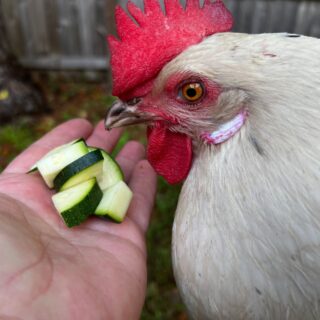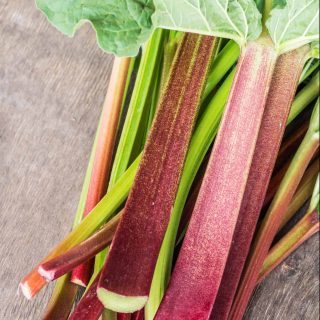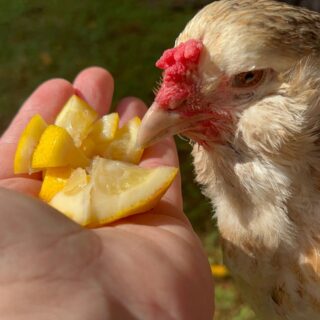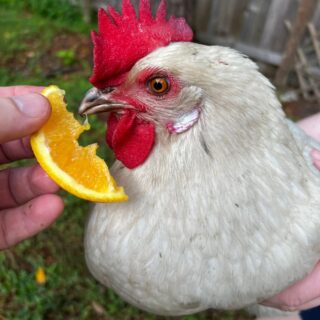Yes, chickens can eat kiwi in it's entirety - the skin, flesh and seeds. Kiwi is a safe and nutrient rich treat to feed chickens as long as they are ripe and haven't gone bad or moldy.
Keep scrolling to find out the benefits of kiwi, how to feed it to your flock and more.
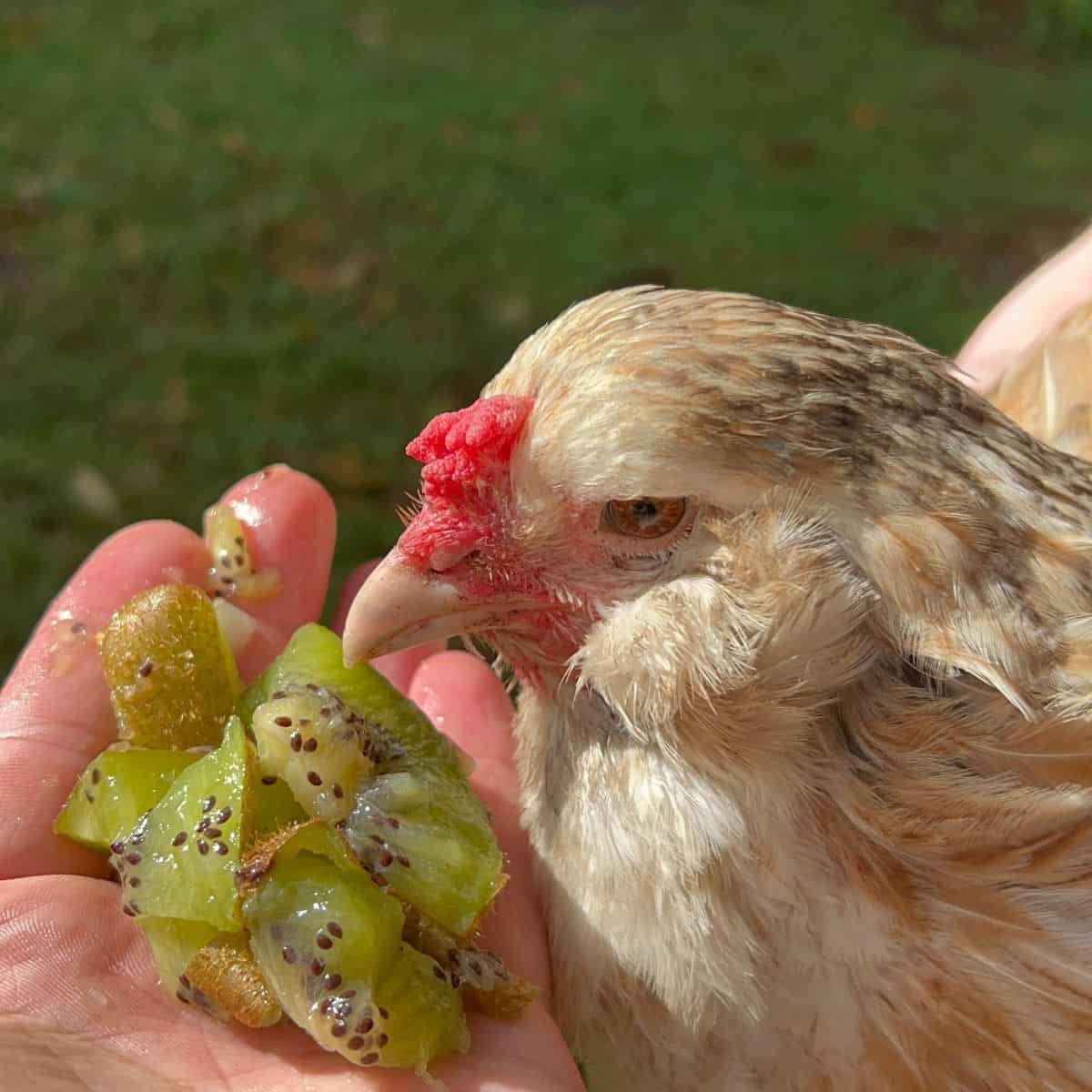
Jump to:
What Parts of Kiwi Can Chickens Eat?
You can keep your chickens healthy letting them eat all parts of a kiwi. Just as long as the kiwi has not gone bad and doesn't have mold or anything of the sort.
Some fruits and veggies are completely safe for chickens to eat. For example, chickens can eat watermelon and chickens can eat radishes. But, while chickens can eat tomatoes and chickens can eat mangoes, some parts of those plants (greens, leaves, stems, etc) can be harmful, or even toxic. So, it's important to know what parts of fruits your chickens can eat.
Can chickens eat kiwi skin and seeds?
Yes, chickens can eat kiwi skin and kiwi seeds. Fortunately, the entire kiwi is safe for chickens. Which is great because it would be terribly difficult to deseed them if the seeds were not safe for them to eat.
The skins actually contain a lot of dietary fiber and other nutrients which are very good for your chickens health.
However, while the skin is safe and nutritious that doesn't always mean your chickens are going to eat it. The skin is not easy to eat.
Chickens can eat cantaloupe, chickens can eat oranges, grapefruits and other fruits with thick rinds also. But, don't be surprised if you happen to find some skins leftover once the fowl feeding frenzy has finally finished.
Though, once your chickens get used to the skin, they may also devour it. We frequently have kiwi with our breakfast and throw the skins to our flock - after the first few days they figured out how to clean those skins right up.
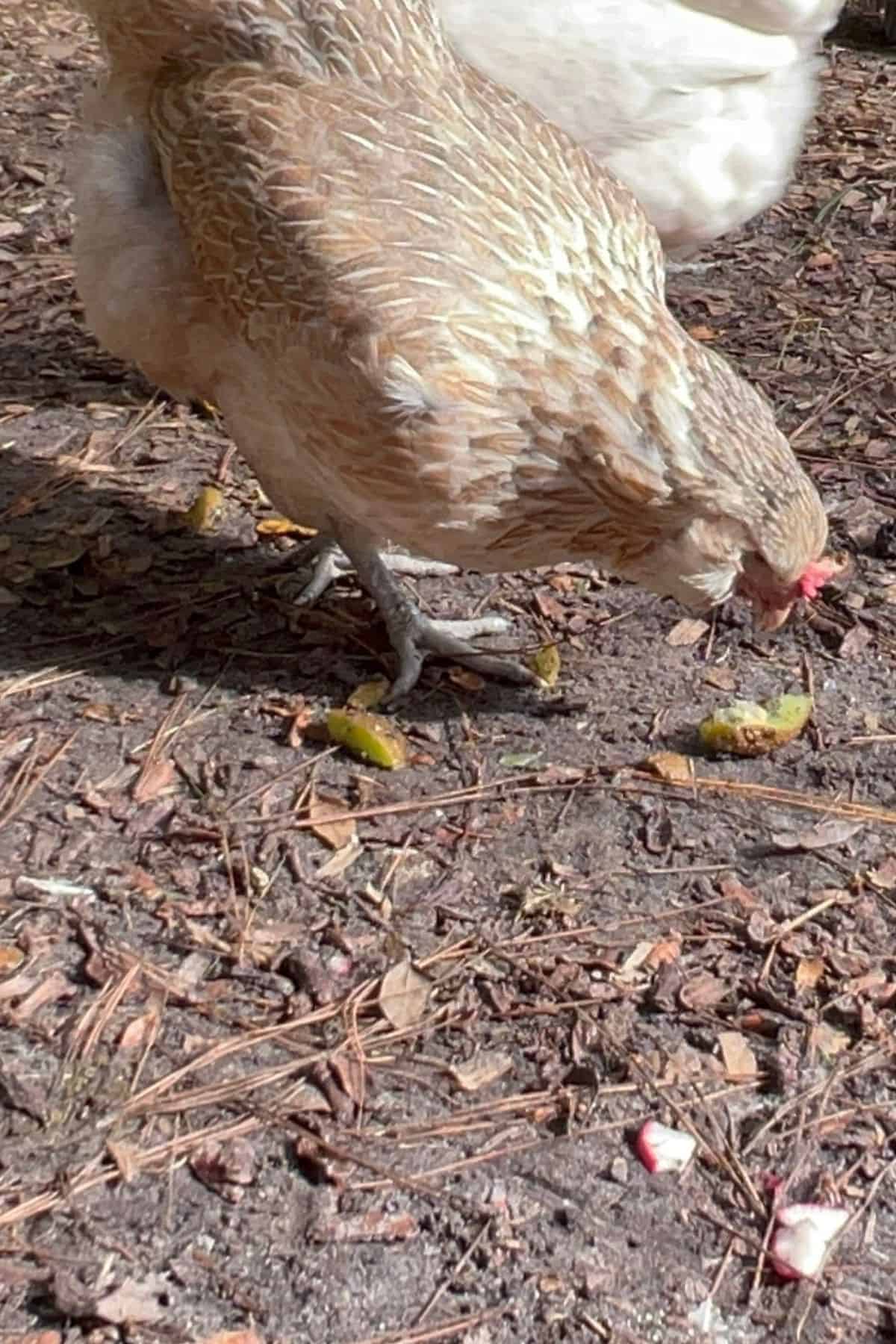
How to Feed Chickens Kiwi
Kiwi isn't very hard to prepare for your flock. We mentioned earlier that the kiwi skin is a little tough but it isn't so tough that a chicken can't peck right through it if you toss them a whole kiwi.
Now, we don't necessarily recommend feeding whole kiwi to your flock. It's so small, most of your chickens won't get any and it can lead to in-flock fighting.
Here's the best way to feed it:
- Wash the outside if leaving the skin on.
- Slice it in half, quarters or small pieces (the more pieces the more it will stop chickens from fighting over it).
- Toss them out to your flock.
You can also make them a fruit medley - Chickens can eat bananas, chickens can eat chopped apples, cherries, blueberries, blackberries,...you get it. Make them a nice, fresh, delicious, fruit salad!
Another fun way to feed kiwi to your chickens is to freeze kiwi first and then give it to them. This is especially good in the summertime. Kick it up a notch, run a piece of string through it, hang it up somewhere about eye level for your chickens, and *BOOM* you have a DIY, boredom-busting, chicken toy!
Treat tips
Two pretty common question are "How much kiwi can I feed?" and "How often can I feed kiwi to my chickens?". When feeding kiwi, or any non-grain based chicken feed, we stick to the 90%/10% rule.
Essentially, this rule just says that 90% of what you feed your chickens should be specially formulated feed made especially for them; usually known as layer feed. Any other kind of food, snack, or treat should only constitute 10% of their diet.
The reason for this is because chickens get almost all of the specific nutrients, in the amounts they need, from their feed and from what they can catch and eat free ranging. Too much of something, even a "good" nutrient, can throw off a chickens internal balance and lead to health problems.
Need some help keeping your chickens health and care taken care of? Check out the Organized Chicken Keeper for an easy to follow system.
Benefits of Kiwi
Kiwi has a ton of vitamins and minerals that can be very helpful for your chickens' health. Below, you'll find several of these nutrients and their health benefits, as well as, a nutritional analysis table.
Here are a few of the main nutrients in kiwi and how they help your flock:
- Vitamin C: supports immune and cellular health as well as overall egg laying. For more vitamin C, chickens can eat papaya.
- Vitamin E: immune system support, and cell regeneration. Feed chickens mango to get them even more.
- Fiber: helps with growth, absorbing nutrients and overall GI function. Chickens can eat blueberries and chickens can eat raisins to get more fiber.
- Potassium: helps to support electrolytes, temperature regulation and hydration. Chickens can eat raspberries and chickens can eat oranges for even more.
The table below, courtesy of the MedicalNewsToday.com, is the nutritional value of 1 kiwi (69 g).
| Energy | 42 | kcal |
| Protein | .8 | g |
| Fat | .4 | g |
| Carbohydrate, by difference | 10 | g |
| Fiber, total dietary | 2.1 | g |
| Sugars, total including NLEA | 6.2 | g |
| Calcium, Ca | 23.46 | mg |
| Magnesium, Mg | 11.7 | mg |
| Potassium, K | 215 | mg |
| Copper, Cu | 90 | mcg |
| Vitamin C, total ascorbic acid | 64 | mg |
| Folate, total | 17.2 | mcg |
| Carotene, beta | 35.9 | mcg |
| Vitamin E | 1 | mg |
| Vitamin K | 27.8 | mcg |
Feeding Chickens Kiwi FAQs
Chickens should not eat any kiwi that is starting to go bad, rotten or moldy. If it's slightly overripe and you would still eat it, it should be OK.
Final Word
Kiwi is a super tasty treat for your chickens. Make sure you feed it in moderation and your chickens will love you all the more for it!
If you need more help with taking care of your chickens, check out The Organized Chicken Keeper for a complete system for managing their health through keeping their supplies stocked and coop clean.

